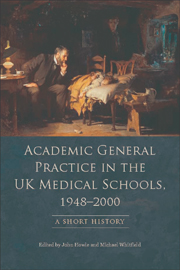Book contents
- Frontmatter
- Contents
- Preface
- Acknowledgements
- Abbreviations
- Timeline
- Introduction
- Dedication
- 1 The University of Aberdeen
- 2 The University of Dundee
- 3 The University of Edinburgh
- 4 The University of Glasgow
- 5 The Cardiff University School of Medicine
- 6 Academic General Practice in Ireland
- 7 The University of Birmingham
- 8 The University of Bristol
- 9 The University of Cambridge
- 10 The University of Exeter
- 11 The University of Leeds
- 12 The University of Leicester
- 13 The University of Liverpool
- 14 The University of Manchester
- 15 The University of Newcastle
- 16 The University of Nottingham
- 17 The University of Oxford
- 18 The University of Sheffield
- 19 The University of Southampton
- 20 The London Medical Schools
- 21 The University of St Andrews
- Appendix 1 Primary Care in the New Medical Schools
- Appendix 2 The SIFT/ACT Negotiations
- Appendix 3 An Overview
- Appendix 4 And Finally…
- Index
14 - The University of Manchester
Published online by Cambridge University Press: 05 August 2013
- Frontmatter
- Contents
- Preface
- Acknowledgements
- Abbreviations
- Timeline
- Introduction
- Dedication
- 1 The University of Aberdeen
- 2 The University of Dundee
- 3 The University of Edinburgh
- 4 The University of Glasgow
- 5 The Cardiff University School of Medicine
- 6 Academic General Practice in Ireland
- 7 The University of Birmingham
- 8 The University of Bristol
- 9 The University of Cambridge
- 10 The University of Exeter
- 11 The University of Leeds
- 12 The University of Leicester
- 13 The University of Liverpool
- 14 The University of Manchester
- 15 The University of Newcastle
- 16 The University of Nottingham
- 17 The University of Oxford
- 18 The University of Sheffield
- 19 The University of Southampton
- 20 The London Medical Schools
- 21 The University of St Andrews
- Appendix 1 Primary Care in the New Medical Schools
- Appendix 2 The SIFT/ACT Negotiations
- Appendix 3 An Overview
- Appendix 4 And Finally…
- Index
Summary
The intellectual environment
During the 1930s, John Ryle's philosophy of ‘social medicine’ was developed. Its central tenet was that illness should be studied in relation to the patient's occupational and social environment. These beliefs were held by Fraser Brockington, who became the Manchester professor of social and preventive medicine, and by Robert Platt, the professor of medicine. A social medicine ‘laboratory’ was required and the then Vice-Chancellor, John Stopford, set about finding one. A suitable building for an experimental health centre was found close to the university.
Darbishire House
Stopford secured grants from the Rockefeller and Nuffield foundations to buy Darbishire House for £17,500 in 1950. All that was needed was some general practitioners to bring their practices into it. The local general practitioners worked single-handed and, with a declining population, were in fierce competition with each other for patients. However, after many meetings, Drs Ashworth, Goldie, Lenten and Davies agreed to move in, reassured by the financial arrangements offered and places on the management committee. Darbishire House Health Centre, with its own laboratory and X-ray facilities, opened in 1954. To facilitate research Bob Logan was appointed reader to liaise between the practice and the department of social and preventive medicine.
- Type
- Chapter
- Information
- Academic General Practice in the UK Medical Schools, 1948-2000A Short History, pp. 64 - 69Publisher: Edinburgh University PressPrint publication year: 2011



